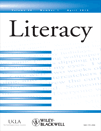
Literacy
Scope & Guideline
Elevating Literacy Studies through Rigorous Research
Introduction
Aims and Scopes
- Diverse Literacy Practices:
The journal focuses on various literacy practices that reflect the cultural, social, and emotional dimensions of reading and writing. It examines how these practices are shaped by factors such as identity, community, and context. - Critical Pedagogies:
It promotes research that investigates critical pedagogies in literacy education, emphasizing social justice, equity, and inclusion. The journal encourages discussions around how literacy instruction can empower marginalized voices. - Multimodal and Digital Literacies:
The incorporation of multimodal and digital literacies is a core area of interest, exploring how technology and various forms of media influence literacy learning and engagement in the classroom. - Teacher Education and Professional Development:
The journal addresses the preparation and ongoing development of educators in literacy instruction, focusing on their beliefs, practices, and the challenges they face in diverse educational contexts. - Literacy and Identity:
A significant emphasis is placed on the intersection of literacy and identity, particularly how students' backgrounds and experiences shape their literacy development and engagement.
Trending and Emerging
- Equity and Social Justice in Literacy Education:
There is a notable increase in research that emphasizes equity and social justice in literacy practices, exploring how literacy can be a tool for empowerment and representation for marginalized groups. - Digital Literacy and Technology Integration:
Emerging themes focus on the impact of digital technologies on literacy practices, including the role of social media, gaming, and digital storytelling in enhancing engagement and comprehension. - Critical Multimodal Literacies:
Research exploring critical multimodal literacies is on the rise, examining how learners interact with various modes of communication, including visual, auditory, and digital texts, to construct meaning. - Teacher Collaboration and Community Engagement:
There is an increasing focus on the role of teacher collaboration and community engagement in literacy education, highlighting how collective practices can enhance literacy outcomes and enrich learning environments. - Neurodiversity and Inclusive Literacies:
Emerging interest in neurodiversity and inclusive literacies is evident, with research exploring how diverse learners, including those with learning differences, engage with literacy in meaningful ways.
Declining or Waning
- Traditional Literacy Instruction:
Research focused on traditional methods of literacy instruction, such as phonics-only approaches, appears to be declining as educators and researchers increasingly advocate for more holistic, integrated pedagogies that consider the broader context of literacy. - Standardized Testing and Accountability:
There seems to be a reduction in articles dedicated solely to discussions around standardized testing and accountability measures in literacy education, potentially indicating a shift towards exploring more qualitative and human-centered approaches. - Single-Discipline Literacy Studies:
Research that isolates literacy studies within a single discipline is becoming less prominent, with a growing trend towards interdisciplinary approaches that connect literacy with broader educational theories and practices. - Deficit Models of Literacy:
Studies that frame literacy challenges as deficits—focusing solely on what students lack—are becoming less common, as there is a growing awareness of the need to highlight strengths and assets within diverse literacy practices.
Similar Journals
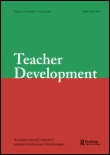
Teacher Development
Exploring New Frontiers in Teacher EducationTeacher Development is a premier academic journal dedicated to advancing the field of education through rigorous research and insightful discourse. Published by Routledge Journals, Taylor & Francis Ltd, this journal boasts an impressive footprint in the educational sector, categorized in the Q2 quartile for the year 2023, underscoring its influence and relevance in the education community. With a dedicated focus on teacher training, professional development, and innovative educational practices, Teacher Development serves as an essential resource for researchers, educators, and policymakers alike. The journal has a solid presence in Scopus, ranked #761 out of 1543 in the Social Sciences Education category, representing a vital platform for the dissemination of cutting-edge pedagogical research. Operating from the United Kingdom, this journal invites contributions that align with its mission to foster informed discourse and promote effective educational strategies, making it an invaluable asset for anyone committed to enhancing the quality of teaching and learning.
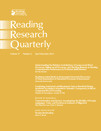
READING RESEARCH QUARTERLY
Championing evidence-based practices in literacy.READING RESEARCH QUARTERLY is a premier academic journal dedicated to advancing the understanding of reading research within the domains of educational psychology and literacy development. Published by Wiley, this journal has been a vital resource for researchers, educators, and practitioners, featuring empirical studies, theoretical papers, and comprehensive reviews since its inception. With a remarkable impact factor and consistently ranked in the Q1 quartile for both Developmental and Educational Psychology and Education, it stands out as an authoritative source in the field. Notably, it possesses a strong international presence, evidenced by its Scopus rankings, sitting in the top 3% for educational social sciences and within the top 5% for developmental psychology. Although currently not offering Open Access, the journal ensures that its contributions are accessible through institutional subscriptions. By linking theoretical frameworks with practical applications, READING RESEARCH QUARTERLY serves as an essential platform for fostering innovation and collaboration among scholars and practitioners aiming to enhance literacy education and understanding.

TESL Canada Journal
Advancing ESL Education Through Innovative ResearchTESL Canada Journal, published by TESL Canada, serves as a vital resource for researchers, educators, and practitioners in the field of English as a Second Language (ESL) and applied linguistics. With its commitment to advancing scholarship and best practices in language education, this esteemed journal fosters a platform for the dissemination of high-quality research and innovative pedagogical approaches. Although it operates without open access, its comprehensive articles and reviews offer valuable insights into current trends and challenges faced by ESL educators across Canada and internationally. The journal is dedicated to promoting a deeper understanding of language acquisition processes and instructional methodologies, contributing significantly to the professional development of its readership. Located in Burnaby, Canada, the journal aims to bridge the gap between theory and practice, making it an indispensable source for educators and researchers looking to enhance their expertise in ESL education.
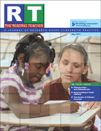
READING TEACHER
Transforming language learning through research and practice.READING TEACHER is a premier journal dedicated to the field of literacy and language education, published by Wiley. With a robust impact factor and a distinguished Q1 ranking in Linguistics and Language, this highly regarded journal serves as an essential resource for educators, researchers, and students aiming to enhance reading instruction and literacy development. The journal covers a broad range of topics within the domain of language and literacy, offering insights into innovative teaching methodologies, research on reading behaviors, and best practices for educational engagement. As the field continues to evolve, READING TEACHER remains committed to advancing scholarship through rigorous peer-reviewed research. Researchers and practitioners can access articles from the journal to stay updated on the latest findings and trends shaping literacy education. For those engaged in the critical study of language acquisition and reading instruction, READING TEACHER is an invaluable part of their academic journey.
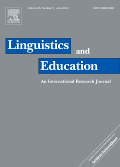
Linguistics and Education
Bridging Language and Learning for Future GenerationsLinguistics and Education, published by Elsevier, is a premier journal dedicated to advancing the understanding of the intersections between linguistics and educational practices. With its ISSN 0898-5898 and E-ISSN 1873-1864, this journal has established itself as a significant platform since its inception in 1988, continuing to produce impactful research up to 2024. It enjoys a prestigious Q1 ranking in both the Education and Linguistics and Language categories, reflecting its high-quality contributions and leading role in the field. The journal’s Scopus rankings further underscore its influence, being placed in the 87th percentile for Arts and Humanities in Language and Linguistics, and the 86th percentile in Social Sciences in Linguistics and Language. Although it operates under traditional subscription access, its contributions are essential for researchers, professionals, and students alike, making substantial strides in the understanding of language, learning environments, and pedagogical strategies. The journal's objective is to foster interdisciplinary dialogue and disseminate innovative research that informs educational policy and practice.
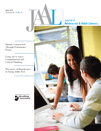
JOURNAL OF ADOLESCENT & ADULT LITERACY
Exploring New Horizons in Literacy DevelopmentJOURNAL OF ADOLESCENT & ADULT LITERACY is a prestigious publication dedicated to the exploration and enhancement of literacy education for adolescents and adults. Published by Wiley, this journal holds an important position in the educational research landscape, marked by its Q2 ranking in Education for 2023, reflecting its commitment to high-quality scholarship. With an ISSN of 1081-3004 and an E-ISSN of 1936-2706, this journal serves as an essential resource for educators, researchers, and policy-makers in understanding literacy development, instructional practices, and the sociocultural factors influencing literacy. Covering a comprehensive timeline from 1995 to 2024, the journal is well-known for its rigorous peer-reviewed articles, providing insights into innovative practices and empirical research that support literacy advancement. Located in the United States, with its headquarters at 111 RIVER ST, HOBOKEN 07030-5774, NJ, the journal does not offer open access but remains an invaluable asset for stakeholders in the realm of education, encouraging discourse and collaboration to foster literacy in diverse and dynamic contexts.
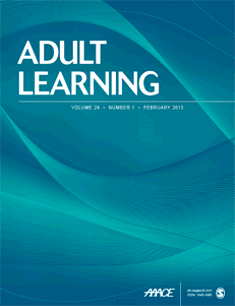
Adult Learning
Exploring Innovations in Adult Education.Adult Learning is a well-respected journal published by SAGE Publications Inc. that has been a cornerstone in the field of education since its inception in 1989. With an ISSN of 1045-1595 and an E-ISSN of 2162-4070, this journal focuses on the dynamics of adult education, exploring innovative practices, theoretical frameworks, and empirical studies aimed at enhancing adult learning experiences. Recognized as a Q2 journal in both Education and Social Sciences (Miscellaneous) categories, it boasts an impressive ranking in the 63rd percentile for Social Sciences and a 50th percentile for Education as per Scopus metrics. The journal fosters a scholarly conversation among researchers, practitioners, and policy-makers, making it an essential resource for anyone interested in advancing the understanding and practice of adult education. Accessible through various academic institutions, Adult Learning serves as a vital platform for disseminating cutting-edge research and innovative practices in the field.

Literacy Research and Instruction
Empowering educators with evidence-based insights.Literacy Research and Instruction is a prestigious scholarly journal dedicated to advancing the field of education, with a particular emphasis on literacy research and pedagogical strategies. Published by Routledge Journals, Taylor & Francis Ltd in the United Kingdom, this journal has established itself as a significant resource for scholars, educators, and practitioners engaged in the intricate processes of learning and language acquisition. With an impressive impact factor and a well-regarded position in the Q1 category of Linguistics and Language and Q2 in Education, it is ranked highly among its peers, both in Scopus Ranks and overall academic impact. The journal covers a broad range of topics in literacy education, making it essential reading for those conducting innovative research and seeking evidence-based instructional practices. By providing valuable insights and fostering scholarly discourse, Literacy Research and Instruction plays a vital role in shaping effective literacy education practices worldwide.

JOURNAL OF LITERACY RESEARCH
Advancing literacy research for a brighter tomorrow.JOURNAL OF LITERACY RESEARCH is a leading scholarly journal published by SAGE Publications Inc., dedicated to advancing the field of literacy studies through rigorous research and critical analysis. With an impact factor reflecting its high-quality contributions, this journal has achieved Q1 rankings in both Education and Linguistics and Language, positioning it among the top-tier publications in these fields. The journal has a comprehensive scope that includes various aspects of literacy research, bridging theoretical frameworks and practical applications. Researchers, educators, and students will find valuable insights in its articles, addressing critical issues from emergent literacy to adult education in diverse contexts. Available as an open access resource, the JOURNAL OF LITERACY RESEARCH ensures that cutting-edge research is accessible to a global audience, fostering an inclusive environment for disseminating knowledge and supporting literacy initiatives worldwide. For more information, visit the journal's page at [SAGE Publications](https://journals.sagepub.com/home/jlr).

Journal of Language and Literacy Education
Exploring the Future of Language and Literacy in Diverse CommunitiesThe Journal of Language and Literacy Education, published by the University of Georgia, College of Education, is an essential resource for researchers, educators, and students engaged in the dynamic field of language and literacy. With an ISSN of 1559-9035 and a commitment to open discussions on contemporary educational practices, this journal aims to bridge the gap between theory and practice, fostering innovative pedagogical approaches that resonate with diverse learning communities. Operating from 427 Tucker Hall, Athens, GA 30602, the journal holds a notable position in the Social Sciences - Education category, ranked at #854 out of 1543 in Scopus, with a 44th percentile standing. Spanning a converged period from 2020 to 2024, it offers a platform for cutting-edge research, critical reviews, and discourse surrounding language acquisition, literacy development, and educational strategies. Engaging with this journal not only enriches academic pursuits but also elevates professional practices within the field.